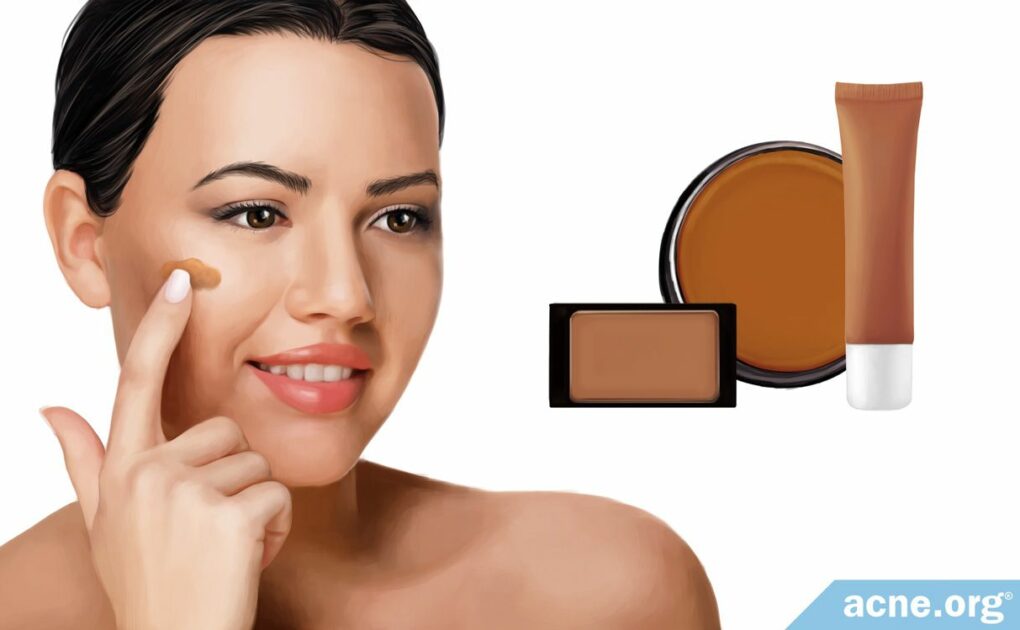Select a Bronzer That Does Not Contain Any Pore-clogging Ingredients and Be Gentle When Applying It to the Skin

The Essential Info
Before buying a bronzer for acne-prone skin, look at the ingredients. Avoid bronzers that contain pore-clogging ingredients.
To be on the safe side, steer clear of fragranced products, since fragrances may irritate the skin and thus worsen acne, or may cause allergies in some people.
In addition, consider avoiding bronzers containing an ingredient called bismuth oxychloride, which appears to cause irritation and itch in some people.
Important Considerations When Using Bronzer
- Apply it gently: Be very gentle when you apply bronzer to avoid irritating the skin.
- Remove makeup before bed: The skin is extra sensitive at night. Be sure to remove all makeup very gently before bed.
- Don’t use expired makeup: Only use fresh makeup products.

The Science
- Guidelines for Choosing a Bronzer for Acne-prone Skin
- List of Common Comedogenic Ingredients in Makeup
- Tips for Using Bronzer on Acne-prone Skin
Bronzer is a makeup product that defines facial contours, emphasizes bone structure, and gives the skin a tanned appearance. There are many types of bronzers on the market, including pressed powder, liquid, and water-based varieties.1-3 Bronzers are removable makeup products and should not be confused with self-tanning products, which react chemically with the skin to create the appearance of a tan than lasts several days.4
Since makeup can potentially contribute to acne,5 choosing a bronzer that is safe for acne-prone skin may seem like a difficult task. Fortunately, finding a product that is safe for your skin is simply a matter of following these guidelines:
Guidelines for Choosing a Bronzer for Acne-prone Skin
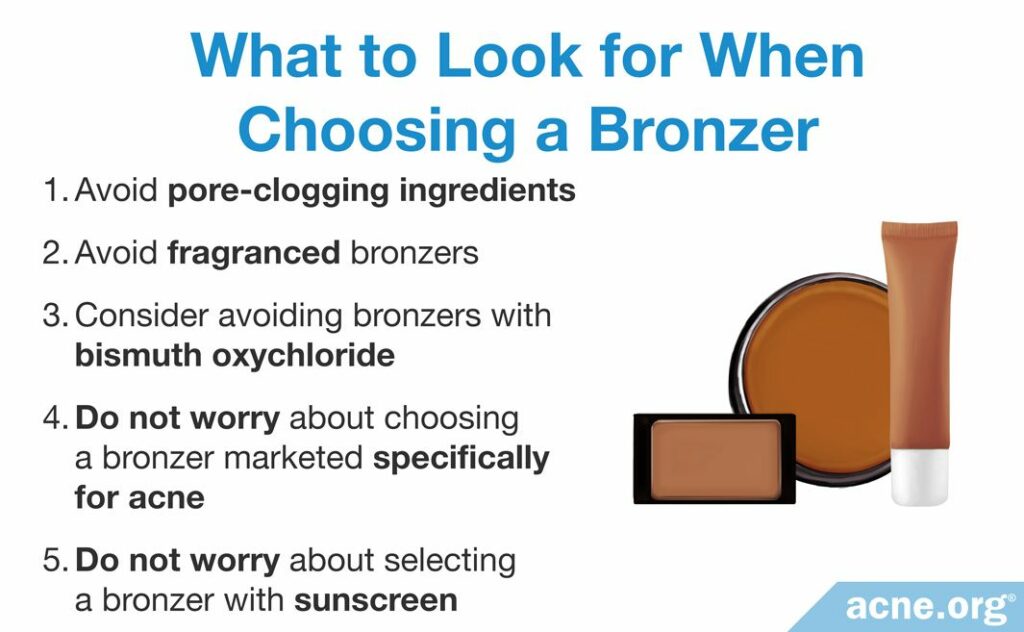
- Avoid pore-clogging ingredients: Before buying a bronzer or any other makeup product, check the ingredient list first. Avoid bronzers with pore-clogging (comedogenic) ingredients. The table below provides a comprehensive list of common comedogenic ingredients.
- Avoid fragranced bronzers: Fragrances, which are found in some bronzers, are the ingredient most likely to cause allergies. Even if you are not allergic to fragrances, they may irritate your skin and in doing so, make acne worse. Your best bet is to select a fragrance-free bronzer.
- Consider avoiding bronzers that contain bismuth oxychloride: Some manufacturers add bismuth oxychloride to bronzers to create a shimmering effect. While there is no hard evidence that bismuth oxychloride irritates the skin, anecdotal reports from multiple consumers suggest that it may lead to irritation and itch. If you find that your skin is sensitive to bismuth oxychloride, consider avoiding bronzers containing this ingredient. We will continue to monitor the research and update these guidelines if hard data become available.
- Don’t worry about choosing a bronzer marketed specifically for acne: Some manufacturers produce bronzers for acne-prone skin by adding salicylic acid, which is a common over-the-counter anti-acne active ingredient. Although salicylic acid is somewhat beneficial for acne-prone skin, the amount of salicylic acid that can reach the skin from bronzer is negligible, since people normally only apply bronzer in small amounts. Don’t worry about trying to find a bronzer with salicylic acid.
- Don’t worry about selecting a bronzer with sunscreen: While some bronzers contain sunscreen, the amount of bronzer that most people use is insufficient to adequately protect the skin from the sun. Therefore, don’t worry about buying a bronzer with sunscreen. Instead, consider using a stand-alone sunscreen or a foundation that contains broad-spectrum sun protection.
List of Common Comedogenic Ingredients in Makeup
Many laboratories have investigated how likely various ingredients are to cause clogged pores (comedones).5 Based on a thorough review of this research, we have compiled two lists:
- Definitely avoid: These are ingredients that people with acne-prone skin should definitely avoid, because a convincing body of evidence shows that they are comedogenic.
- Consider avoiding: These are ingredients that people with acne-prone skin may want to consider avoiding, because some evidence indicates that they might be comedogenic.
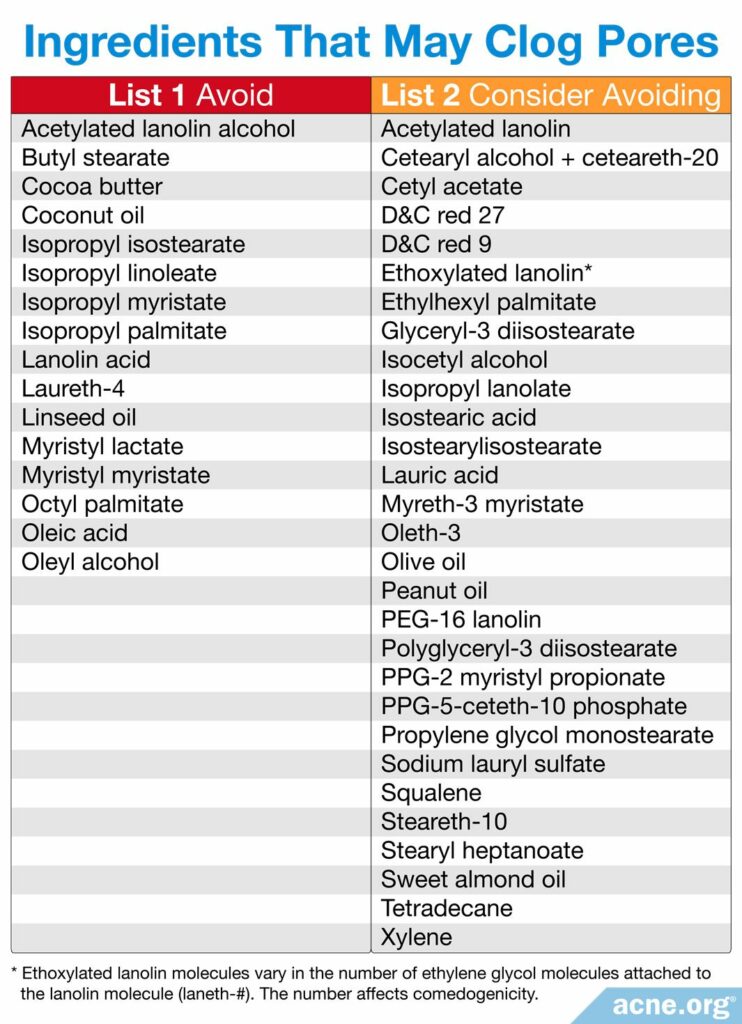
Tips for Using Bronzer on Acne-prone Skin
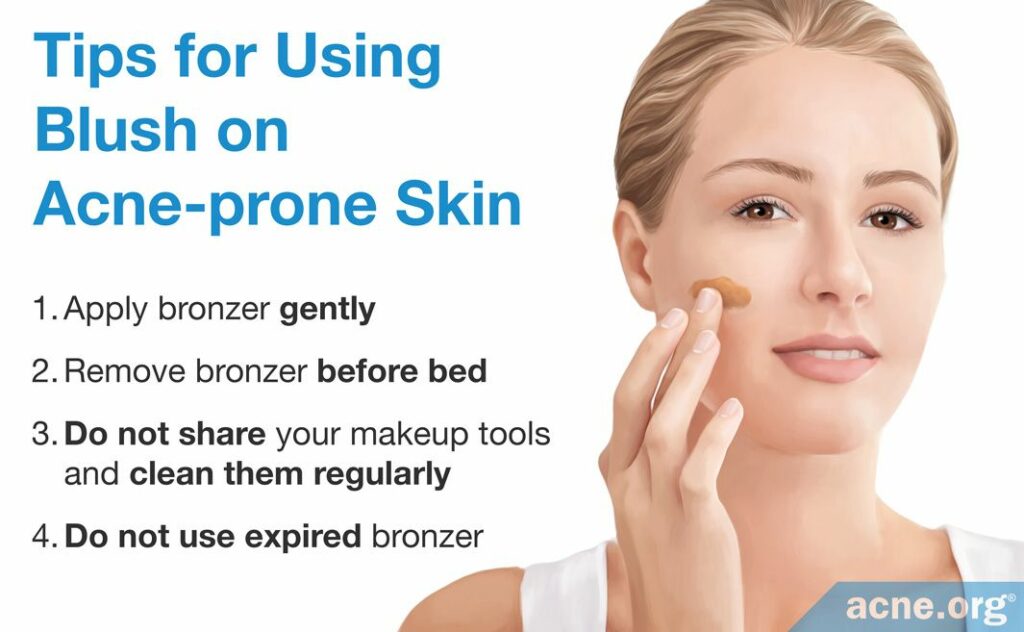
Whenever you apply bronzer or any other makeup to acne-prone skin, the most important thing is to avoid irritating the skin, because physical irritation of the skin can worsen acne.6 Good hygiene is also essential in order to prevent skin infections. When you use bronzer on acne-prone skin, keep these tips in mind:
- Apply bronzer gently: Select the softest makeup brushes or sponges, or simply use your fingertips, and apply bronzer very gently so as not to irritate the skin.
- Remove bronzer before bed: The skin is more vulnerable at night, so it is important to remove bronzer and any other makeup before you go to bed. Again, be gentle when removing makeup to avoid irritating your skin.
- Do not share your makeup tools and clean them regularly: Do not share your makeup brush or other makeup tools with anyone. Sharing makeup tools increases your chances of contracting a skin infection. Use disposable tools or clean your tools regularly to prevent the growth of bacteria and mold.
- Do not use expired bronzer: An expired bronzer may begin to harbor bacteria or start to break down. Never use makeup that is past its expiration date.
Bronzer Ingredients: The Full Scoop
Bronzer is a makeup product that:
- Defines facial contours
- Enhances bone structure
- Lends a tanned appearance to the skin without the harm of sun exposure1-3
Bronzers versus self-tanning products
Some people use the term “bronzer” to refer to self-tanning products, also known as fake tanning products. Although both bronzers and self-tanning products create the appearance of tanned skin without sun exposure, they achieve this in different ways:3,4
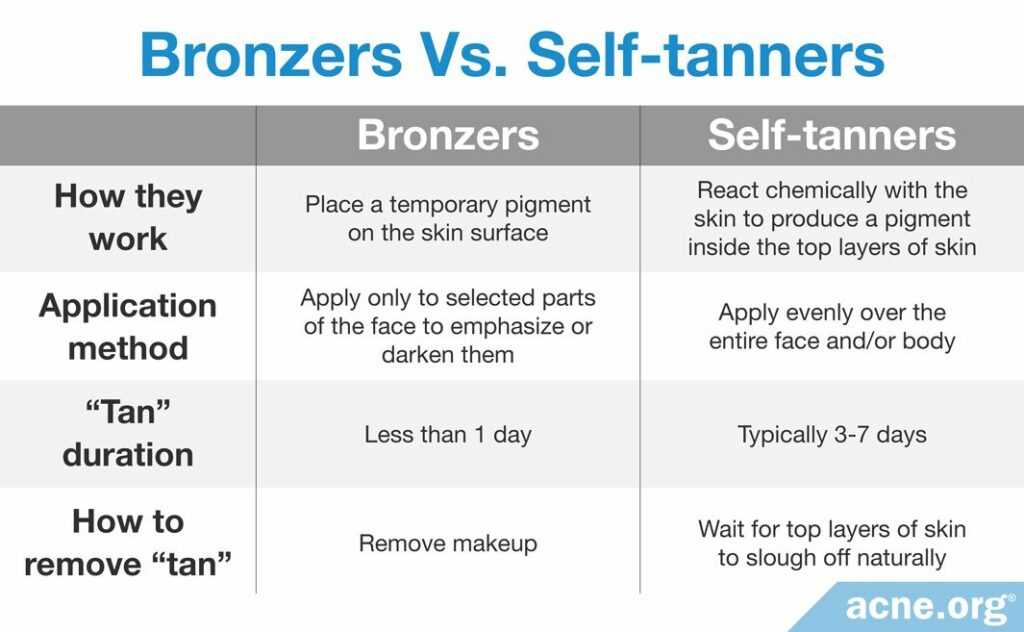
Throughout this article, we use the term “bronzer” to refer to the temporary makeup product, not the self-tanning product.
Types of bronzer
There are many types of bronzer, including pressed powders, loose powders, liquids, and sticks.2 Consumers usually choose among these types based on personal preferences. Four of the most common types of bronzer are:
- Pressed powder
- Water-based gel
- Liquid
- Beads of compressed powder
Each variety of bronzer contains some unique ingredients. Because bronzer in the form of pressed powder is the most popular, we will look at its ingredient in the most detail.1,7
Powder bronzer ingredients
Some of these ingredient types may be comedogenic or irritating and are therefore marked with an asterisk (*). Before buying bronzer, take a look at the list of ingredients and check that none of them appear in the list of comedogenic ingredients at the beginning of this article.
Also avoid bronzers containing any ingredients to which you have allergies. If you suspect you may be allergic to a bronzer, but are not sure, you can perform a patch test. Place a small amount of product on an inconspicuous patch of skin and wait several hours to see whether you experience skin irritation or itching.
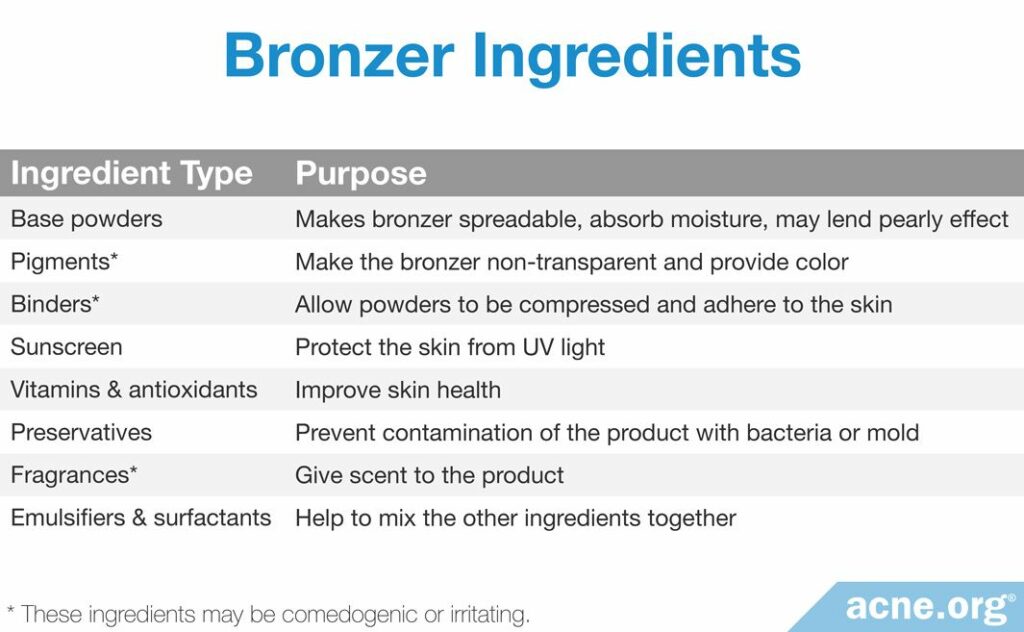
Sunscreen in bronzer
If you spend a lot of time in the sun, it is important to protect your skin from the sun’s rays. Excessive sun exposure can lead to sunburn, and in people with acne, it can also contribute to so-called post-inflammatory hyperpigmentation (darkening of acne lesions after they heal).
Although some bronzers do contain sunscreen, the amount of bronzer that most people use is too small to provide adequate sun protection. Therefore, if you plan to spend a significant amount of time in the sun, the best strategy is to use a separate sunscreen product or a foundation containing broad-spectrum sunscreen for sun protection.
Salicylic acid in bronzer
Most bronzers do not contain salicylic acid, but a few do. Salicylic acid is somewhat beneficial for acne-prone skin. However, over-the-counter products like makeup are legally only allowed to contain a tiny amount of salicylic acid: 2% at most. Such a low concentration of salicylic acid is unlikely to dramatically improve acne. Not only that, but most people tend to use only a small amount of bronzer, which means the amount of salicylic acid that ends up on the skin is negligible. In other words, while having salicylic acid in your bronzer might be slightly beneficial, a bronzer without salicylic acid can still be a good choice for acne-prone skin.
References
- Riley, P. Decorative cosmetics. (2000). In: Poucher’s Perfumes, Cosmetics and Soaps, 10th Edition. Kluwer Academic Publishers. 166-184. http://priede.bf.lu.lv/grozs/AuguFiziologijas/Augu_resursu_biologija/gramatas/Perfumes%20Cosmetics%20Soaps.pdf
- Available from: https://en.wikipedia.org/wiki/Cosmetics. Accessed on 28/08/2017.
- Available from: https://en.wikipedia.org/wiki/Contouring. Accessed on 28/08/2017.
- Garone, M., Howard, J., & Fabrikant, J. (2015). A review of common tanning methods. Review. The Journal of Clinical and Aesthetic Dermatology, 8, 43-7. https://www.ncbi.nlm.nih.gov/pmc/articles/PMC4345932/
- Katoulis A. C., Kakepis E. M., Kintziou H., Kakepis M. E. & Stavrianeas N. G., (1996). Comedogenicity of cosmetics: a review, Journal of the European Academy of Dermatology and Venereology, 7, 115-119. https://onlinelibrary.wiley.com/doi/abs/10.1111/j.1468-3083.1996.tb00606.x
- Mills, O. H. & Kligman, O. (1975). Acne mechanica, Archives of Dermatology, 111, 481-483. https://www.ncbi.nlm.nih.gov/pubmed/123732
- Valet, B., Mayor, M., Fitoussi, F., Capellier, R. Dormoy, M. & Ginestar J. (2007). Colouring Agents in Decorative and other Cosmetics. In: Analytical Methods Analysis of Cosmetic Products, 1st Edition. Elsevier 145-148 https://kundoc.com/pdf-colouring-agents-in-cosmetic-products-excluding-hair-dyes-.html
 Acne.org Products
Acne.org Products